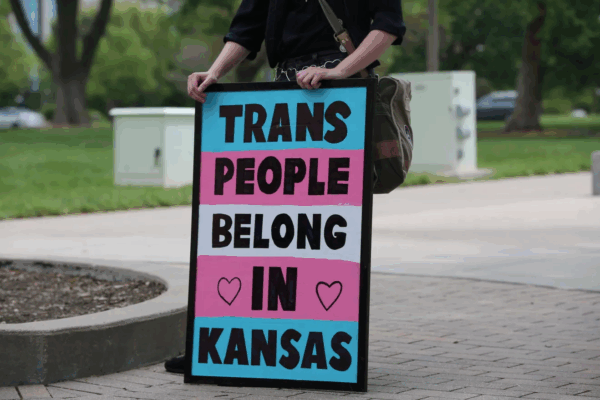COURTS
Transgender individuals to be allowed to raise constitutional questions over Kansas law
Andrew Bahl
Topeka Capital-Journal
A Shawnee County judge on Friday said she will allow a legal group representing transgender Kansans to intervene in an ongoing case over whether trans individuals should be allowed to change the gender marker on their driver's licenses.
Attorneys for the ACLU of Kansas and Attorney General Kris Kobach's office sparred in court Wednesday over the issue, which comes amid the ongoing legal dispute over the impact of a new law, Senate Bill 180.
Kobach filed a lawsuit last month seeking to compel the Kansas Department of Revenue to permanently halt gender marker changes, pointing to SB 180, which outlines strict definitions of sex along biological lines in state law.
Shawnee County Judge Teresa Watson has ordered the agency to pause any marker changes until a hearing is held in November on a longer lasting injunction.
A Shawnee County judge will allow a legal group representing transgender Kansans to intervene in an ongoing case over driver's licenses.
But the ACLU has sought to join the lawsuit, arguing the interests of their five transgender clients would be irreparably harmed if Kobach were to prevail. They want to challenge the constitutionality of SB 180 and argue the Kansas Department of Revenue isn't making those arguments to oppose Kobach's effort.
Their filing pointed to the lived experience of their clients, such as Adam Kellogg, a 20-year-old University of Kansas student who said he was uncomfortable during a traffic stop because the license did not correspond to his gender identity.
"(Kobach's office) brought this lawsuit seeking application of his own interpretation of a recently enacted law and he must contend with the consequences of that interpretation," Sharon Brett, the ACLU's legal director, said on Wednesday. "Denying that silences the voices of transgender Kansans."
Kobach's office has argued that allowing the ACLU to intervene in the case would create a legal "morass" and argued they do not have a substantial interest in the outcome.
Questions over the law's constitutionality are distinct from those raised by the case, Solicitor General Anthony Powell said during oral arguments Wednesday. Only once a proper interpretation is given of SB 180 could those "novel" constitutional questions be properly raised — and Powell said addressing them now could delay the case.
"We're not seeking to silence anybody," Powell said. "We're not afraid of the constitutional questions (the ACLU) wants to bring ... This is a matter of when and what is proper."
Judge to allow transgender individuals to raise constitutional questions
In her Friday ruling, Watson noted that the ACLU has a substantial interest in the ongoing litigation, as they are set to raise constitutional questions that could impact how the law is administered, and that allowing them to intervene would not overly compromise the schedule laid out for the case previously.
"Proposed Intervenors plan to assert that SB 180 as interpreted by the Attorney General, and as applied to the issuance of driver’s licenses, violates Section 1 of the Kansas Constitution Bill of Rights," Watson wrote. "Proposed Intervenors posit that, assuming this is true, SB 180 can be interpreted in a constitutional manner that would allow them to keep or obtain driver’s licenses displaying something other than biological sex at birth."
Watson noted some this type of intervention was unusual in this type of case, where one public official is seeking a court order against another public entity. But she added it would ultimately have little practical effect on the case's timing because of the ongoing block on gender marker changes.
In a statement, Kobach said "the primary legal question remains the same: Does a state agency have to follow the plain meaning of a law passed by our duly-elected legislators?"
"With respect to the constitutional challenge raised by the ACLU, we look forward to rebutting their novel theories in court," he said.
Brett said in a statement that the ACLU was "gratified" by the decision.
"For our clients and the entire community they represent, this case is about the privacy, dignity, and autonomy that comes from having accurate gender markers on their license, and about their right to be safe from the harassment they would face if forced to present inaccurate IDs that would essentially out them against their will in daily life," she said.

